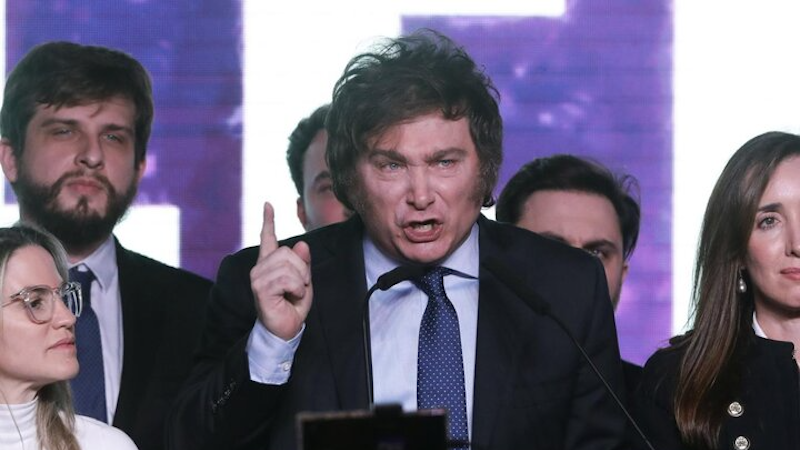





/tpg%2F6173c34e-fc72-471c-94f7-78cdd9fed256.jpeg)

Argentina's economy is undergoing a tumultuous transformation under President Javier Milei, who took office on December 15, 2023. His administration has implemented sweeping reforms aimed at cutting government size and spending, including a drastic 32% reduction in the federal budget and the laying off of nearly 30,000 public sector workers [3a18a04b]. Milei's policies have sparked both controversy and debate, as he also vetoed public sector pension increases, resulting in a 40% real terms cut to pensions [3a18a04b].
In a significant development, Argentina's GDP expanded by 3.9% in the third quarter of 2024, marking the end of a recession that had plagued the country for years. This recovery is attributed to Milei's severe spending cuts and deregulation measures, which have significantly reduced the country's triple-digit annual inflation, dropping from 289% in April 2024 to 117.8% by December 2024 [e3100609][3094e5f2]. By October 2024, inflation rates reportedly plummeted to 2.7% monthly, a significant turnaround that has drawn mixed reactions from the public and economists alike [b15cfe0a][3a18a04b]. Despite this impressive drop in inflation, the social costs of Milei's policies are becoming increasingly apparent. Poverty rates surged to over 53% in the first half of 2024, up from 41.7% earlier in the year, while the unemployment rate has risen to 7.6%, exacerbating the financial strain on many households [a7938332][e3100609]. Political analysts note that while Milei's austerity measures have resulted in a recession, he still maintains high public support, with many Argentines remaining hopeful for economic recovery [0a142a10].
Milei's administration has focused on deregulating markets and eliminating government subsidies, which he argues are necessary to prevent Argentina from collapsing under economic pressure [18832e96]. In July 2024, he launched the Ministry of Deregulation and State Transformation, which has issued 672 regulatory reforms, averaging nearly two per day, including the elimination of 331 regulations and modification of 341 others [e3100609]. He has proposed cutting federal taxes by 90% and introducing a US dollar standard, which he believes could stabilize the economy further [b15cfe0a]. However, critics have raised concerns about the impact on social welfare, particularly as public services, including healthcare, face significant budget cuts. For instance, the budget for HIV treatment was reduced by 67% for 2024, leading to public outcry and protests against the government's actions [a7938332].
The economic landscape has shifted dramatically since Milei took office, with the consumer price index experiencing fluctuations that reflect the instability of the current reforms. Following a brief decline in inflation rates, the consumer price index increased by 4.6% in June 2024, indicating ongoing volatility [583f6ba7]. The Argentine peso has also hit record lows against the dollar, complicating the government's reform agenda and leading to skepticism from the International Monetary Fund (IMF) regarding new agreements [583f6ba7]. However, the IMF recently approved a $44 billion program with Argentina, disbursing $4.7 billion to support the government's economic initiatives [3a18a04b].
Milei has gained international recognition for his economic policies, receiving endorsements from prominent figures such as US president-elect Donald Trump and billionaire Elon Musk [3094e5f2]. Argentina's sovereign bonds have also seen improvement, with a decrease in the premium over US Treasuries, falling 4.4% to 677 basis points, down from over 2,000 basis points when Milei assumed office [3094e5f2]. While supporters of Milei's policies praise his commitment to fiscal discipline and the potential for long-term economic recovery, the immediate effects of his reforms have led to widespread protests, particularly from pensioners and state workers affected by budget cuts [0a142a10]. Many citizens, like Viviana Quevedo, have lost their jobs and livelihoods due to the economic overhaul, raising questions about the sustainability of such aggressive measures [a7938332][18832e96]. As Argentina navigates this complex economic landscape, the balance between recovery and social stability remains precarious. Notably, the first budget surplus in 123 years was achieved under Milei's leadership, marking a significant milestone for the Argentine economy [b15cfe0a].
In contrast, Bangladesh faces its own economic challenges, with a forecast indicating that its GDP may surpass Argentina's by 2039, although its per capita GDP remains lower [e3100609]. The country struggles with bureaucratic hurdles, requiring 190 documents to start a footwear factory, which stifles economic growth [e3100609]. As inflation in Bangladesh reached 10.89% in December 2024, the interim government is taking extraordinary actions in the banking sector to stabilize the economy [e3100609]. As both nations grapple with their unique economic landscapes, the question remains: can Bangladesh learn from Argentina's radical deregulation approach under Milei?